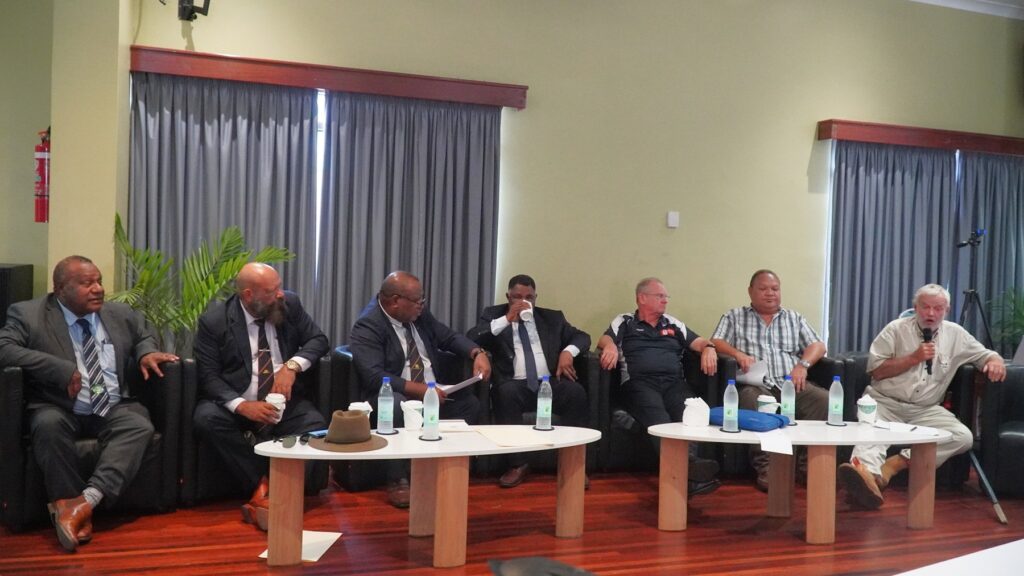LAE, Morobe Province, Friday, April 11, 2025 – Legendary Morobe cattleman and long-time Papua New Guinea resident, Steve Farhall, delivered a heartfelt and urgent address during a high-level panel discussion alongside Prime Minister Hon. James Marape and Minister for Agriculture Hon. John Boito at the National Agriculture Industry Public-Private Sector Partnership Conference in Lae. His powerful remarks called for decisive action to revive the country’s declining cattle industry and empower smallholder farmers across rural PNG.
Farhall, who first arrived in PNG in 1976 as a young VSO volunteer, shared a deeply personal reflection of his nearly 50-year journey in the country’s rural heartlands — a journey shaped by dedication to agriculture, especially cattle farming, and by his deep ties to the people and land of Morobe. Now 70 years old and married to a woman from Gitua in Sialum, Tewai-Siassi, Farhall’s passion for agriculture remains as strong as ever — underscored by his 12-hour dinghy voyage to attend the conference in Lae.
“We’ve got somewhere around 4 to 5 million people under the age of 35 living in rural areas,” he said. “Many are uneducated, unemployed, and worst of all — they have no hope. That’s the scope of the problem we must address.”
Farhall expressed serious concern over the rapid decline in cattle numbers over the past decade. He revealed that in 2015, PNG had roughly 70,000 to 75,000 head of cattle and was nearly self-sufficient in prime beef. However, a series of setbacks — including the collapse of commercial farms such as Trukai and the transition of others like Markham Farm into oil palm operations — saw numbers fall dramatically.
“Around 8,000 head were lost from Trukai, and about 9,000 from Markham,” he noted. “What we lost along with those herds was a central buying centre — a place where smallholders could sell their cattle, both the good and the bad, and have access to markets.”
Farhall, who once operated that buying centre alongside industry partners, said its absence has left smallholder farmers without a market, without support, and without purpose.
He outlined several critical reforms needed to revive the industry:

- Finance Accessibility: Current legislation makes it nearly impossible for smallholders to access bank financing based on clan land usage agreements. “That needs to change,” he urged. “We should be able to finance one hectare of cocoa or 250 head of cattle with the right land agreements.”
- Tariff Exemptions on Inputs: Farhall advocated for reduced tariffs on livestock equipment, particularly fencing materials. “A kilometre of barbed wire fencing costs about K18,000. The same could be done for K4,000 with electric fencing. These materials benefit everyone.”
- Infrastructure and Support Services: He called for the establishment of “nuclear” centres in larger agricultural zones to provide extension services and ensure enforcement of regulations.
- Law and Order: Addressing systemic law and order issues, he said the police-to-population ratio had drastically worsened since Independence. “We had one officer per 600 people at Independence. Now it’s one to 2,500,” he said. He also urged support for village court magistrates and district courts, particularly in remote areas like Kabwum and Kaiapit, where judicial services are absent.
Despite these challenges, Farhall struck a hopeful note: “We’re not in an impossible situation. If we work together as a team — government, private sector, and communities — we can solve these problems.”
He concluded by thanking Prime Minister Marape and Minister Boito for their leadership and reaffirmed his lifelong commitment to Papua New Guinea’s rural transformation.
“Let’s fix this together,” he said. “We can make it work.”
###